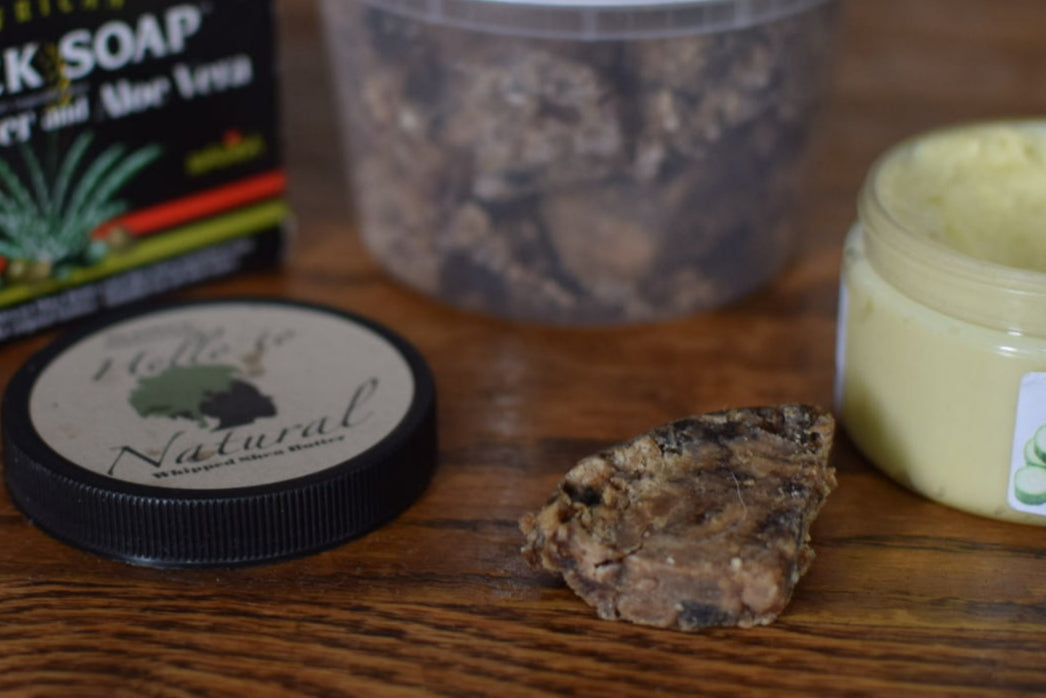
African Black Soap Uses, Benefits, and Tips
What is African Black Soap?
African Black soap is a soap originating from West Africa that is made from the ashes of locally harvested plants, including plantain leaves, cocoa pods, palm tree leaves, and shea tree bark. It has been used for ages for its healing and restorative properties.
What are the benefits and uses of black soap?
- It's antibacterial, an excellent alternative to chemical-laden cleansers.
- It's safe for all skin types
- It's moisturizing, due to its crucial ingredient, Shea butter
- It won't make your skin oily
- It helps soothe irritation, itchiness and irritation caused by eczema, contact dermatitis, and skin allergies. It may even help clear rashes related to eczema and psoriasis. To maximize these benefits, find a soap with oatmeal added.
- It's anti-inflammatory, beneficial for people who have inflammatory conditions like rosacea.
- It helps fight acne. Its antimicrobial properties may even clear severe acne caused by Propionibacterium acnes bacteria.
- It may help reduce fine lines. Shea butter and coconut oil may help reduce collagen loss and encourage new development. In turn, this can help plump up fine lines and wrinkles. The rough texture of the soap can also exfoliate dead skin cells that make fine lines more noticeable.
- It helps protect against photoaging
- It helps improve skin texture due to the natural ingredients working as an skin exfoliant
- It helps prevent razor burn and related rashes
- It may help reduce hyperpigmentation, often caused by acne scarring and sun damage
- It may help minimize the appearance of scars and stretch marks
- It's antifungal. One study on the effects of African black soap found the product effective for seven types of fungus — this includes the common Candida albicans yeast. You can safely use African black soap to help treat conditions like toenail fungus and athlete's foot.
Who is black soap meant for?
Black soap is meant to be used by anyone and everyone, and can be used on all skin types.
Why is it called African Black Soap?
African Black Soap gets its name from the original translation of what it was called in Africa. African black soap or ose dudu originated with the Yoruba people in Nigeria and the Yoruba communities in Benin and Togo. The Yoruba words ose (“soap”) and dudu (“black”) literally translates to “the black soap.” It is also called anago samina in Ghana. (Anago is the name of a Yoruba sub-group in what is now Republic of Benin). Samina means, “soap” in the Twi dialect of the Akan language.
What's the difference between black soap bars and raw black soap?
Raw black soap looks like brownish chunks, and can be used like any other soap. It contains no extra ingredients except for the base ingredients of potash, shea butter, and natural oils such as palm kernel and coconut. Black soap bars contain the original ingredients plus additional ingredients that can have other beneficial properties.
Does black soap exfoliate?
The ash in the soap helps to naturally and gently exfoliate the skin, clearing clogged pores of excess oil, sebum and debris, without over drying. This is key, since drying the skin too much can actually trigger more oil and sebum production. The soap also helps to tone the skin and improve its texture over time. It helps to clear up old acne spots.
Does Black Soap dry out your skin?
For some individuals the raw black soap dries out the skin. Black soap bars that including moisturizing ingredients such as shea butter and aloe vera will probably be better for dry skin types.
If it’s drying out your skin, try using less. A little goes a long way and using too much soap will definitely be drying to already parched skin. If you have sensitive and/or dry skin start out by using it only once a day.
Be sure to use a moisturizer, hydrating serum, or oil afterwards, especially if your skin tends to be dry, and during winter months when cold weather could further dry out the skin.
Where Can I Get Black Soap?
Get some African Black soap from here!

